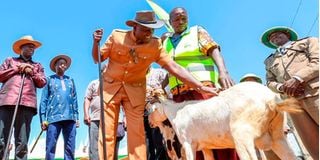Premium
Kimalel Goat Auction to get boost from Sh140m slaughterhouse

President William Ruto, From left: Deputy President Rigathi Gachagua, and Baringo County Governor Benjamin Cheboi with other leaders during the Kimalel Goat Auction and Cultural Festival in Baringo County on December 14.
What you need to know:
- During former President Daniel arap Moi’s time, chiefs were tasked to select the best goats from farmers in their locations for the goat auction.
- Thousands of goats would be sold during the occasion, and any chief that brought emaciated goats would face the wrath of the President.
The annual Kimalel Goat Auction took place in Baringo South two weeks ago on December 14, reviving memories from the Moi era when the cultural fair was treated with a lot of seriousness.
This year’s auction raised more than Sh40 million from the sale of more than 3,000 goats, with President William Ruto and his deputy Rigathi Gachagua buying goats worth Sh15 million.
The President and his deputy bought more than 1,000 goats amounting to Sh15,000 million. Their purchase, broken down, was Sh15,000 per goat.
While presiding over the event at the Kimalel grounds, the President insisted on cash payments for the sales, stating that he would not accept those buying to issue cheques or take goats on credit.
“I want us to buy the goats now and I am not going to accept any cheque from the buyers, only cash transactions...,” said President Ruto, who collected more than Sh40 million from the dignitaries who bought the goats.
During former President Daniel arap Moi’s time, chiefs were tasked to select the best goats from farmers in their locations for the goat auction, which attracted Moi's allies and prominent politicians in the country.
Thousands of goats would be sold during the occasion, and any chief that brought emaciated goats would face the wrath of the President, who would inspect the goats personally before the auction.
The Baringo county government revived the famous Kimalel Goat Auction in 2014 and introduced the cultural component to make it a fun-filled event, which has seen millions of shillings raised to support farmers. The auction was started in 1986 by the late retired President Moi in an effort to improve the living standards of farmers in Baringo County, most of whom depended on livestock as their economic mainstay. The late President nominated then MP and ally, Ezekiel Barng’etuny, auctioneer in charge of organising the event, which would see over 8,000 goats sold in just one day through bidding.
Following its revival in 2014, a crisis arose after Mr Barng’etuny died a few days before the auction, forcing the county government of Baringo to look for an alternative person to oversee the auction.

Hundreds of goats were on sale during this year's Kimalel Goat Auction and Cultural Festival, Baringo County on December 14, 2023.
The job went to Erick Bett, a former Kenya Postal Corporation boss and a close ally of Moi’s. The event was graced by former President Uhuru Kenyatta and by former President Moi, as well as a host of other dignitaries. As fate would have it, Mr Bett ended up ruffling a few feathers.
According to Mr Bett, Former President Uhuru Kenyatta, who was under pressure to attend a certain function in Nairobi, called him and told him that he wanted to leave.
“He told me to continue selling the goats but allow him to go quietly for the said meeting in Nairobi,” says Mr Bett, adding that he convinced Mr Kenyatta to stay on for another 20 minutes because if he left, the crowd would disperse, bringing an end to the auction. He complied, though reluctantly.
Before the 20 minutes elapsed, however, he said, the President called him again.
“I went to the dais where he was seated, mark you I was breaking the protocol. I knelt before him and he told me that he would pay for the remaining goats, but I should invite him right away to close the auction and leave, otherwise, he said he was leaving in a huff,” says Bett.
Mr Bett took the microphone and invited the president to the dais as ordered. In the programme, then Senator Gideon Moi was supposed to give a vote of thanks and invite the President to announce the collections of the day.
“The Senator and other local leaders were mad at me, asking who I was to invite him,” narrates Mr Bett, who ended up becoming the shortest-serving auctioneer at this long-running event through no fault of his.
Construction of a Sh141 million slaughterhouse in Mogotio Sub-County, which is almost complete, is set to raise the profile of the goat auction. The multi-million-shilling project, funded by the European Union is expected to benefit over 400,000 livestock farmers and traders, who account for over 60 percent of the county’s total population.





